Like the past two books that Albom has published (one fiction, one non-fiction memoirs), it deals with life and death. “Tuesdays With Morrie” centered on his old professor and how he looked at life with death quickly approaching. In “The Five People You Meet in Heaven” it centered around the theme of what the main character did with his life, and his penance while traveling to Heaven. In this book, he looks at what would we do if we had one more day with a loved one AFTER their death.
The story’s main character is Charley “Chick” Benetto. It follows his days as a child dealing with an over macho father and a stern yet loving mother. It looks at how he dealt with the very abrupt ending of his parents’ marriage. It looks at how even years after not seeing his father Chick still tried to please him. It looks at the self destruction of his life and eventual suicide attempt. It deals with the emotions that he was too scared to show, the times he realized that he needed to stand up for his mother and didn’t, and all the times that she stood up for him. Much like Albom’s previous books, this tugs at the heartstrings.
Albom’s style of writing is very simple. (He says that comes through necessity from being a newspaper columnist.) Much like the famed Dan Brown (author of “The DaVinci Code”), it is at a level that pre-teens can read. But unlike Brown’s stories that are filled with just the action of what is happening to the paper thin characters, being led around from event to event like Pavlov’s dog, Albom’s stories are filled with character building events, adding oodles of depth to them for such a short story. (They are classified as novels, but novellas are probably the more proper classification.) So even though a 5th grader can read it, a book reading veteran can get so much out of it, too.
All three of Albom’s recent publications can make you look at things differently. Even if just for the time you are reading the book. To me that is a sign of good writing. Even if it is over hyped a bit.
"For One More Day" by Mitch Albom
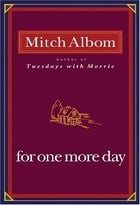 Posted : 17 years, 4 months ago on 20 February 2008 02:34
(A review of For One More Day)
Posted : 17 years, 4 months ago on 20 February 2008 02:34
(A review of For One More Day) 0 comments, Reply to this entry
0 comments, Reply to this entry
"Tuesdays With Morrie" by Mitch Albom
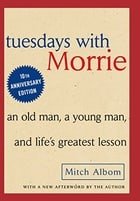 Posted : 17 years, 4 months ago on 20 February 2008 02:33
(A review of Tuesdays with Morrie: An Old Man, a Young Man, and Life's Greatest Lesson)
Posted : 17 years, 4 months ago on 20 February 2008 02:33
(A review of Tuesdays with Morrie: An Old Man, a Young Man, and Life's Greatest Lesson)I have always liked Albom’s writing style and his ideals. He is well known because he is a sports columnist and appears on ESPN. But that’s just his job. His perception and outlook on life are much bigger then the world of sports. And often times he sees that and brings that out in his column. Sports just happens to be the back drop.
This is the second of Mitch’s books that I have read, with “The Five People You Meet in Heaven” being the first. That was his first try at fiction, and has been incredibly successful. “Tuesdays With Morrie” is non-fiction, but reads like fiction. He tells the story of his weekly meetings with Morrie Schwartz, a college professor of his that is dying of ALS (Lou Gerhig’s Disease). They basically talk about the meaning of life, and how Morrie doesn’t feel sorry for himself while having this deadly and debilitating disease. But how he views life differently, and he gets a chance to get the most out of life, because he knows the end is approaching.
In some respects this is a book that all people should read. Morrie’s outlook and his opinions on life, death, marriage, forgiveness, etc. would be well for all of us to learn. Or at least to read and take from it what we want. Sure, we all have our own opinions and beliefs. But Morrie has much to teach anyone. Just being who he is and what he does and approaches life while facing death alone would be a good lesson for all to learn. Not just his philosophies on the subjects him and Mitch discuss.
It is a engaging book and surely will make you think and contemplate your life.
This is the second of Mitch’s books that I have read, with “The Five People You Meet in Heaven” being the first. That was his first try at fiction, and has been incredibly successful. “Tuesdays With Morrie” is non-fiction, but reads like fiction. He tells the story of his weekly meetings with Morrie Schwartz, a college professor of his that is dying of ALS (Lou Gerhig’s Disease). They basically talk about the meaning of life, and how Morrie doesn’t feel sorry for himself while having this deadly and debilitating disease. But how he views life differently, and he gets a chance to get the most out of life, because he knows the end is approaching.
In some respects this is a book that all people should read. Morrie’s outlook and his opinions on life, death, marriage, forgiveness, etc. would be well for all of us to learn. Or at least to read and take from it what we want. Sure, we all have our own opinions and beliefs. But Morrie has much to teach anyone. Just being who he is and what he does and approaches life while facing death alone would be a good lesson for all to learn. Not just his philosophies on the subjects him and Mitch discuss.
It is a engaging book and surely will make you think and contemplate your life.
 0 comments, Reply to this entry
0 comments, Reply to this entry
"The Five People You Meet in Heaven"
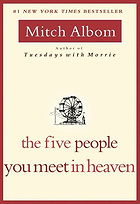 Posted : 17 years, 4 months ago on 20 February 2008 02:30
(A review of The Five People You Meet in Heaven)
Posted : 17 years, 4 months ago on 20 February 2008 02:30
(A review of The Five People You Meet in Heaven)This is a real departure for me, because I have been only reading science fiction and fantasy since the early 90’s. It is really a novella. Rather short at 196 pages, and rather small. About the size of a paperback, yet with big hardcover text. So why did I read it? Glad you asked. Because of the author, Mitch Albom.
Albom’s biggest claim to fame is being a sport columnist for the Detroit Free Press. He has won many awards for his writing in newsprint, and also appears on the “Sports Reports” on ESPN. You can read about him and his other accomplishments at his website. The thing is that he is not just a great sports writer. He is a great writer, period. His column usually runs from Monday to Friday in the Sports section (on the website too), then he contributes a non-sports column on Sunday. Needless to say, I have always enjoyed his work since I have been reading his column for years. So when I saw this book, even not being about sports or a genre I usually read, I was not hesitant whatsoever in purchasing it.
It is a really an interesting story. It was light, so it became an easy read for a vacation. (And seeing it was small, it was easy to carry.) But just because of it’s lack of size didn’t mean it was good. The story is about Eddie, a maintenance man at an amusement park that dies while trying to save an 8 year old girl. And on his way to Heaven, Eddie meets five people that he has some connection with. These five people better help him understand his life, why certain things happened, and be able to put away issues that haunted him during his life.
This story could have easily been twice the length. But even still, it told the story it needed to, and the story is the strength. Albom’s writing is very good. Again proving that he is a writer first and foremost who just happens to cover sports. It is a great, touching, quick read, that is well worth the read
Albom’s biggest claim to fame is being a sport columnist for the Detroit Free Press. He has won many awards for his writing in newsprint, and also appears on the “Sports Reports” on ESPN. You can read about him and his other accomplishments at his website. The thing is that he is not just a great sports writer. He is a great writer, period. His column usually runs from Monday to Friday in the Sports section (on the website too), then he contributes a non-sports column on Sunday. Needless to say, I have always enjoyed his work since I have been reading his column for years. So when I saw this book, even not being about sports or a genre I usually read, I was not hesitant whatsoever in purchasing it.
It is a really an interesting story. It was light, so it became an easy read for a vacation. (And seeing it was small, it was easy to carry.) But just because of it’s lack of size didn’t mean it was good. The story is about Eddie, a maintenance man at an amusement park that dies while trying to save an 8 year old girl. And on his way to Heaven, Eddie meets five people that he has some connection with. These five people better help him understand his life, why certain things happened, and be able to put away issues that haunted him during his life.
This story could have easily been twice the length. But even still, it told the story it needed to, and the story is the strength. Albom’s writing is very good. Again proving that he is a writer first and foremost who just happens to cover sports. It is a great, touching, quick read, that is well worth the read
 0 comments, Reply to this entry
0 comments, Reply to this entry
"Toxicity" by System of a Down
 Posted : 17 years, 4 months ago on 20 February 2008 02:01
(A review of Toxicity)
Posted : 17 years, 4 months ago on 20 February 2008 02:01
(A review of Toxicity)SOAD was considered one of the Nu-Metal bands of the mid 90’s. Nu-Metal being hard rock / heavy metal with rapped vocals and even samples and maybe even scratching. Well, SOAD is with the rock-metal sound, and at times the rapid fire vocals are shouted and given a rapped-like sound. But timing in the release of their first album is what really had them classified in that genre. Now these days, they are considered one of the “new wave of progressive rock” bands that are coming out. Of course, they don’t like how the media keeps changing their labels. Malakian has mentioned in interviews that SOAD is not the most original band in the world, but it may still be hard to classify the band.
I would agree that it is hard to classify them. Though I tend to label bands, and do that in my write-ups here, I do it to help describe them. I just like good music. And that’s what SOAD provides. Most of the songs deal with social issues. A good description that I read is that SOAD picked up the baton that Rage Against the Machine dropped when they broke up. This in itself doesn’t interest me. I liked Rage mostly due to having three cracking great musicians (who are now in Audioslave with Chris Cornell). But SOAD uses a sarcastic wit which makes it more interesting to listen to. They also have an outrageous sense of humor. Some of the songs are worth a listen just for a laugh. “Needles” (”My tape worm tells me what to do / My tape worm tells me where to go”) and “Bounce” (about going on a date and showing the girl and her friends tricks on a pogo stick) are the best of those.
Now I will admit too that the progressive rock label has some merit. Progressive rock doesn’t mean what it used to back in the early 70’s when it had it’s birth. Prog rock these days usually means great musicianship, intricate and complex chords, time and key changes, though it is also highlighted with longer songs. Well, an average SOAD song clocks in at 3:00, but the other “symptoms” are there. Malakian is an excellent guitarist and switches easily from super power crunch speed metal riffs to ethnic folk acoustic guitar and mandolin without missing a beat and doesn’t make any of it out of place. Tankian screams and bellows at times, typical maybe of the style of music, and uses a staccato rapid fire vocal sequence from time to time too, but he also can sing. And Dolmayan I think is just a damn fine drummer.
The biggest reason I like this album though is that it’s catchy. Every single song sticks with me. I find almost every song on this album going through my head days after listening to it. And that is probably the best sign of a great album.
I would agree that it is hard to classify them. Though I tend to label bands, and do that in my write-ups here, I do it to help describe them. I just like good music. And that’s what SOAD provides. Most of the songs deal with social issues. A good description that I read is that SOAD picked up the baton that Rage Against the Machine dropped when they broke up. This in itself doesn’t interest me. I liked Rage mostly due to having three cracking great musicians (who are now in Audioslave with Chris Cornell). But SOAD uses a sarcastic wit which makes it more interesting to listen to. They also have an outrageous sense of humor. Some of the songs are worth a listen just for a laugh. “Needles” (”My tape worm tells me what to do / My tape worm tells me where to go”) and “Bounce” (about going on a date and showing the girl and her friends tricks on a pogo stick) are the best of those.
Now I will admit too that the progressive rock label has some merit. Progressive rock doesn’t mean what it used to back in the early 70’s when it had it’s birth. Prog rock these days usually means great musicianship, intricate and complex chords, time and key changes, though it is also highlighted with longer songs. Well, an average SOAD song clocks in at 3:00, but the other “symptoms” are there. Malakian is an excellent guitarist and switches easily from super power crunch speed metal riffs to ethnic folk acoustic guitar and mandolin without missing a beat and doesn’t make any of it out of place. Tankian screams and bellows at times, typical maybe of the style of music, and uses a staccato rapid fire vocal sequence from time to time too, but he also can sing. And Dolmayan I think is just a damn fine drummer.
The biggest reason I like this album though is that it’s catchy. Every single song sticks with me. I find almost every song on this album going through my head days after listening to it. And that is probably the best sign of a great album.
 0 comments, Reply to this entry
0 comments, Reply to this entry
"As the Crow Flies" by Jeffrey Archer
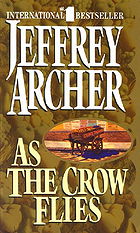 Posted : 17 years, 4 months ago on 19 February 2008 06:46
(A review of As the Crow Flies)
Posted : 17 years, 4 months ago on 19 February 2008 06:46
(A review of As the Crow Flies)There is so much to the story of following Charlie’s life and his feud with the Trentham family. And you find out a lot from each character where Archer uses a nice writing trick. Every once in a while there is a chapter in the first person from another character’s perspective, including Charlie’s wife Becky, their son Daniel, friend Daphne, former commanding officer and then company chairman Colonel Hamilton, rival Mrs. Trentham, and employee Cathy. Usually a few chapters following those key around that character. It may not add a huge amount of depth to the characters, but it at least gives you an idea of what they were thinking, leading them to react the way they did or do the things they do.
Now given the length of the book, the characters are not as deep as one might expect. But like I said, there is more then one important character. Though given the amount of time that the major characters get, they are pretty well drawn out. Also, the books deals with a rather long span of time. When we meet Charlie, he is 7 or 8 years old (born in 1899) and we follow it through to the last scene of the book that takes place in 1970. So the biggest factor of this book is the story. It drives everything. Events may happen fast, or we skip over years between chapters, but it’s hitting all the necessary points in the characters’ lives. With the length of the story, even the large gaps of time that are skipped over doesn’t take away from the story at all. It really makes the story flow very well, leaving no dull or boring part and always left me wanting to read more.
The only issue I had with some of the story is the “soap opera” feel it had at times. However, it doesn’t really take away from the story. Some may find it unappealing, but when some of it crept in, I was already too far involved for it to turn me off. Also there is a bit of reality in that “soap opera” likeness. For instance, some of the lengths that Mrs. Trentham goes to are all to help her son hide a few secrets. But like anything that you do on the sly, eventually you are covering many tracks and the lengths to which you will go only become greater. There were also a few times when things would seem to be too convenient for Charlie, but soon enough there was a catch, or something else to derail him also lending some reality to the story. Or sometimes as he is laughing at his rival’s misfortune, he would turn around and see something similar happen to him.
Despite any flaws, this turned out to be a great story. I had been struggling to find something of interest in the world of fiction to read. I put down almost a dozen books after only getting through the first few pages. And despite it’s length, I read this one off rather quickly. It was a great way to break out of that rut. The simple (though very British at times) prose along with an engaging story made it a very enjoyable read.
Now given the length of the book, the characters are not as deep as one might expect. But like I said, there is more then one important character. Though given the amount of time that the major characters get, they are pretty well drawn out. Also, the books deals with a rather long span of time. When we meet Charlie, he is 7 or 8 years old (born in 1899) and we follow it through to the last scene of the book that takes place in 1970. So the biggest factor of this book is the story. It drives everything. Events may happen fast, or we skip over years between chapters, but it’s hitting all the necessary points in the characters’ lives. With the length of the story, even the large gaps of time that are skipped over doesn’t take away from the story at all. It really makes the story flow very well, leaving no dull or boring part and always left me wanting to read more.
The only issue I had with some of the story is the “soap opera” feel it had at times. However, it doesn’t really take away from the story. Some may find it unappealing, but when some of it crept in, I was already too far involved for it to turn me off. Also there is a bit of reality in that “soap opera” likeness. For instance, some of the lengths that Mrs. Trentham goes to are all to help her son hide a few secrets. But like anything that you do on the sly, eventually you are covering many tracks and the lengths to which you will go only become greater. There were also a few times when things would seem to be too convenient for Charlie, but soon enough there was a catch, or something else to derail him also lending some reality to the story. Or sometimes as he is laughing at his rival’s misfortune, he would turn around and see something similar happen to him.
Despite any flaws, this turned out to be a great story. I had been struggling to find something of interest in the world of fiction to read. I put down almost a dozen books after only getting through the first few pages. And despite it’s length, I read this one off rather quickly. It was a great way to break out of that rut. The simple (though very British at times) prose along with an engaging story made it a very enjoyable read.
 0 comments, Reply to this entry
0 comments, Reply to this entry
"Seven Types of Ambiguity" by Elliot Per
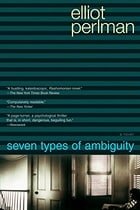 Posted : 17 years, 4 months ago on 19 February 2008 06:44
(A review of Seven Types of Ambiguity)
Posted : 17 years, 4 months ago on 19 February 2008 06:44
(A review of Seven Types of Ambiguity)I had stumbled across this book through Amazon’s “recommendations” that they give customers. That was probably two years ago. I found it interesting, so I put in on my wish list, and months later deleted it. I saw it later at Costco and almost picked it up. Finally, for some reason, two months ago I had an urge to search out the book again. I found it at Amazon for a bargain price and quickly bought it. I’m so glad I gave into the urge.
There are references to Empson’s “Seven Types of Ambiguity” in the book, mostly through Simon who is a teacher of literature and poetry. And there are other references to ambiguity in general that probably coincide with Empson’s theories, but turning them to life instead of poetry. But to be honest, I just didn’t see how they effected the story, or missed some of those references. The biggest reason why was being too involved in the story to really care. To me, this is a very engrossing story.
The different points of view was a great way to layout the telling of the story. It showed some guts in my opinion. I would think that it’s very hard to voice so many characters, but then have each one be a first-person narrative for sections of the book. Perlman doesn’t do too bad of a job at it either. However, it just isn’t all that cut and dry. The first chapter is Dr. Alex Klima’s first person, but he is strictly talking to Anna and pretty much only speaks of Simon’s feelings for her and his life after their break-up. You actually find out nothing about Alex in this section. Alex also is a main contributor to Dennis’ section, as all the chapters key on his sessions with the Alex.
The story in some ways is far-fetched. All of these people are so linked to one another it makes your head spin. Almost like a soap opera. But the writing style, prose, and language of those involved, along with the depth of character gives so much more. Another strength is seeing how these relationships effect each other and their actions and vice versa. And re-reading events through another’s point of view added realism, how some see something as very little, and yet some one else sees it as something big. The points of view also gave you different looks at the characters. Especially of Simon. He is seen very differently through the eyes of Anna, as compared to Angelique, as compared to Alex. You get this with most of the characters. This does add a bit of a problem however, trying to figure out who is a better judge of character.
Some reviews I have read have pointed out the flaws of the writing. I missed many of them because the story was so well told and so very interesting. Perlman never gives you more facts then you need to know. He made it into a read page turner. That’s saying something for a book that clocks in at over 600 pages. There were times too when he sounded off about issues or subjects, using the characters voice, in which some reviewers disliked. To me even these parts were well handled and rather seamless. It didn’t seem like Perlman was using it as a platform for his opinions or ideals. They were just part of the story.
It’s a big book, but readers shouldn’t let that scare them. Once I read those opening chapters I didn’t want to put it down. I think that many readers would feel the same way.
There are references to Empson’s “Seven Types of Ambiguity” in the book, mostly through Simon who is a teacher of literature and poetry. And there are other references to ambiguity in general that probably coincide with Empson’s theories, but turning them to life instead of poetry. But to be honest, I just didn’t see how they effected the story, or missed some of those references. The biggest reason why was being too involved in the story to really care. To me, this is a very engrossing story.
The different points of view was a great way to layout the telling of the story. It showed some guts in my opinion. I would think that it’s very hard to voice so many characters, but then have each one be a first-person narrative for sections of the book. Perlman doesn’t do too bad of a job at it either. However, it just isn’t all that cut and dry. The first chapter is Dr. Alex Klima’s first person, but he is strictly talking to Anna and pretty much only speaks of Simon’s feelings for her and his life after their break-up. You actually find out nothing about Alex in this section. Alex also is a main contributor to Dennis’ section, as all the chapters key on his sessions with the Alex.
The story in some ways is far-fetched. All of these people are so linked to one another it makes your head spin. Almost like a soap opera. But the writing style, prose, and language of those involved, along with the depth of character gives so much more. Another strength is seeing how these relationships effect each other and their actions and vice versa. And re-reading events through another’s point of view added realism, how some see something as very little, and yet some one else sees it as something big. The points of view also gave you different looks at the characters. Especially of Simon. He is seen very differently through the eyes of Anna, as compared to Angelique, as compared to Alex. You get this with most of the characters. This does add a bit of a problem however, trying to figure out who is a better judge of character.
Some reviews I have read have pointed out the flaws of the writing. I missed many of them because the story was so well told and so very interesting. Perlman never gives you more facts then you need to know. He made it into a read page turner. That’s saying something for a book that clocks in at over 600 pages. There were times too when he sounded off about issues or subjects, using the characters voice, in which some reviewers disliked. To me even these parts were well handled and rather seamless. It didn’t seem like Perlman was using it as a platform for his opinions or ideals. They were just part of the story.
It’s a big book, but readers shouldn’t let that scare them. Once I read those opening chapters I didn’t want to put it down. I think that many readers would feel the same way.
 0 comments, Reply to this entry
0 comments, Reply to this entry
"The Alienist" by Caleb Carr
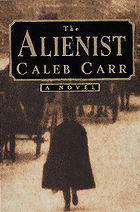 Posted : 17 years, 4 months ago on 19 February 2008 06:44
(A review of The Alienist)
Posted : 17 years, 4 months ago on 19 February 2008 06:44
(A review of The Alienist)The story is told from the first-person perspective, that being from John Schuyler Moore, a writer for the New York Times. It takes place in 1896 in Manhattan. Two close friends of Moore’s, back from their college days, are alienist Laszlo Kreizler (alienist was a term used at the time for one that treated those with mental illnesses) and the head of the New York City Police Board of Commissioners Theodore Roosevelt (yes, the real Teddy Roosevelt). As the story begins, Roosevelt calls Kreizler and Moore together to do an investigation, though obviously not official, of a recent murder of a boy-whore, though it appears that two others cases before are also connected. Roosevelt is in the middle of a shake-up with the New York PD, having fired the chief of police and many long-time cops that were loyal to the former, while hiring new ones. At the time too, there were many murders that would not only go unsolved, but would not even be investigated, usually due to those involved (like whores and the poor). But the sheer grizzly manner that these boys have been murdered, and Roosevelt’s desire to what must be done, he can’t just let things go. He enlists the help of brothers Lucius and Marcus Isaacson, both detective sergeants on the force and loyal to Roosevelt, and Sara Howard who is Roosevelt’s secretary but hoping to pursue a career in criminal investigation.
There are many famous people of the time that are characters, though in small roles, in the book (J. P. Morgan, Jacob Riis, Lincoln Steffens, Monk Eastman, Anthony Comstock, Thomas Byrnes, Archbishop Michael Corrigan, James T. “Biff” Ellison, Paul Kelly, Franz Boas, and Clark Wissler). Also, Jesse Pomeroy who committed some grizzly murders as a 16 year old is also a character, which helps the investigation, though he is “re-located” by Carr to Sing Sing prison, when in fact he was imprisoned in Massachusetts. For the staunch criminal fan, this may frowned upon. For those like me that didn’t know better and had to look it up, I found it interesting, because it really added to the story.
Carr is a historian, and it seems obvious to me that he knows his stuff. His writing was confident, like he knew the surrounding territory like the back of his hand. Sure, he grew up on the Lower East Side, where most of the story takes place. But certainly not in 1896. His writing style also added so much to the story. He used foreshadowing quite often at the end of the chapter, and it wasn’t always known where you would need that bit of information. Sometimes the thoughts were continues the in the first lines of the next chapter. Sometimes it was half a book away.
He drew strong characters. All five were very realistic. They had flaws. They didn’t always understand each other’s information. Sometimes it was a fight to get all five people on the same page (no pun intended). And through out the book, the characters stayed strong. One chapter, after obtaining a note that the killer had sent to a victims mother, the five sit down and discuss all it means. It was a real headspinner. Not only does Carr give you a huge amount of great information that is concise and very in depth, he also gives it to you in a way that you can understand, and presented through the characters that doesn’t seemed like a forced information dump, and still manages to keep all the characters in character. Amazing! His fleshing out of those famous men that he brought in was very good, especially Roosevelt who played the biggest part of those.
I also think Carr did a great job in bringing in those “politics” of the time and area. The corruption surrounding the PD, the way certain “businessmen” conducted their business, and the way that some were only looking out for themselves, not caring who committed the murders, but what hoe is effected them. It gave me great insight to the time and the happenings of that era.
Another point I liked about this story was not knowing a thing about the killer and watching the characters try to put it all together. None of it came across as “writer magic”: having a great idea for a story, but not knowing how to properly put it all together so it doesn’t seem forced. Though you didn’t get to see into the mind of the killer on a personal level, you still got to know more about them at the same pace as the characters did. It made for great reading.
The book is part mystery, without really being a full fledged mystery, in my opinion. It is part horror, without really being a horror story (though it was nominated for the Bram Stoker Award that usually signifies a horror-type story). And it is also part historical fiction. With all three working in the best possible terms, it turned out to be a fantastic book.
There are many famous people of the time that are characters, though in small roles, in the book (J. P. Morgan, Jacob Riis, Lincoln Steffens, Monk Eastman, Anthony Comstock, Thomas Byrnes, Archbishop Michael Corrigan, James T. “Biff” Ellison, Paul Kelly, Franz Boas, and Clark Wissler). Also, Jesse Pomeroy who committed some grizzly murders as a 16 year old is also a character, which helps the investigation, though he is “re-located” by Carr to Sing Sing prison, when in fact he was imprisoned in Massachusetts. For the staunch criminal fan, this may frowned upon. For those like me that didn’t know better and had to look it up, I found it interesting, because it really added to the story.
Carr is a historian, and it seems obvious to me that he knows his stuff. His writing was confident, like he knew the surrounding territory like the back of his hand. Sure, he grew up on the Lower East Side, where most of the story takes place. But certainly not in 1896. His writing style also added so much to the story. He used foreshadowing quite often at the end of the chapter, and it wasn’t always known where you would need that bit of information. Sometimes the thoughts were continues the in the first lines of the next chapter. Sometimes it was half a book away.
He drew strong characters. All five were very realistic. They had flaws. They didn’t always understand each other’s information. Sometimes it was a fight to get all five people on the same page (no pun intended). And through out the book, the characters stayed strong. One chapter, after obtaining a note that the killer had sent to a victims mother, the five sit down and discuss all it means. It was a real headspinner. Not only does Carr give you a huge amount of great information that is concise and very in depth, he also gives it to you in a way that you can understand, and presented through the characters that doesn’t seemed like a forced information dump, and still manages to keep all the characters in character. Amazing! His fleshing out of those famous men that he brought in was very good, especially Roosevelt who played the biggest part of those.
I also think Carr did a great job in bringing in those “politics” of the time and area. The corruption surrounding the PD, the way certain “businessmen” conducted their business, and the way that some were only looking out for themselves, not caring who committed the murders, but what hoe is effected them. It gave me great insight to the time and the happenings of that era.
Another point I liked about this story was not knowing a thing about the killer and watching the characters try to put it all together. None of it came across as “writer magic”: having a great idea for a story, but not knowing how to properly put it all together so it doesn’t seem forced. Though you didn’t get to see into the mind of the killer on a personal level, you still got to know more about them at the same pace as the characters did. It made for great reading.
The book is part mystery, without really being a full fledged mystery, in my opinion. It is part horror, without really being a horror story (though it was nominated for the Bram Stoker Award that usually signifies a horror-type story). And it is also part historical fiction. With all three working in the best possible terms, it turned out to be a fantastic book.
 0 comments, Reply to this entry
0 comments, Reply to this entry
"Fall on Your Knees" by Ann-Marie MacDon
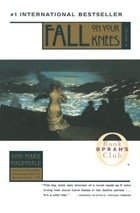 Posted : 17 years, 4 months ago on 19 February 2008 06:40
(A review of Fall On Your Knees)
Posted : 17 years, 4 months ago on 19 February 2008 06:40
(A review of Fall On Your Knees)This book was suggested to me by a former co-worker. The synopsis that usually accompanies the book on Amazon is very short and sweet, and almost makes it sound like a sweeping epic of romantic “chick-lit.” (Excuse the derogatory comment please.) I was surprised that he would read something like that, and was hesitant to get a copy. Well, thanks to BookMooch I found a copy and decided to get it, since there had to be more to it. As you can tell from the description above, after digging deep into the reviews at Amazon, that it’s a meaty read. It runs the gambit of everything from dark themes to good humor.
The biggest aspect that made the book such a compelling read was MacDonald’s writing style. She pulled all the tricks correctly. She foreshadowed very well. Sometimes she would come right out and tell you the tragic event, leaving the reader (or at least me) going, “What the hell?!” Then she would go back and play out the moments or reasons for the events. She held off the biggest secret until the end, and did it in a fascinating way. Frances learns the real secrets, then lets the others in on them. But the person that needs to know the biggest secret is led through by a diary. And it’s saved for the last quarter of the book. It was all pulled off very well. She kept the story so interesting that you didn’t mind not knowing the secrets, or even knowing that they were there. MacDonald’s prose also played out very well. Being very poetic at times, or almost surreal. But again, at the right moments to describe the scene.
The dark themes of the book are not very graphic. Some are glanced over rather quickly. For those with a weak stomach, fear not. The story is steeped in all the crazy things that make for a thick plot. But she doesn’t tell you things you don’t need to know. Just enough.
Quite a gripping read.
The biggest aspect that made the book such a compelling read was MacDonald’s writing style. She pulled all the tricks correctly. She foreshadowed very well. Sometimes she would come right out and tell you the tragic event, leaving the reader (or at least me) going, “What the hell?!” Then she would go back and play out the moments or reasons for the events. She held off the biggest secret until the end, and did it in a fascinating way. Frances learns the real secrets, then lets the others in on them. But the person that needs to know the biggest secret is led through by a diary. And it’s saved for the last quarter of the book. It was all pulled off very well. She kept the story so interesting that you didn’t mind not knowing the secrets, or even knowing that they were there. MacDonald’s prose also played out very well. Being very poetic at times, or almost surreal. But again, at the right moments to describe the scene.
The dark themes of the book are not very graphic. Some are glanced over rather quickly. For those with a weak stomach, fear not. The story is steeped in all the crazy things that make for a thick plot. But she doesn’t tell you things you don’t need to know. Just enough.
Quite a gripping read.
 0 comments, Reply to this entry
0 comments, Reply to this entry
"The Girl in the Glass" by Jeffrey Ford
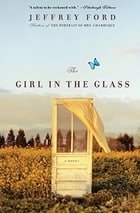 Posted : 17 years, 4 months ago on 19 February 2008 06:38
(A review of The Girl in the Glass: A Novel)
Posted : 17 years, 4 months ago on 19 February 2008 06:38
(A review of The Girl in the Glass: A Novel)The first thing I noticed with this novel is that the fancier prose from the first novel I read “The Portrait of Mrs. Charbuque” is missing. Or to say it is really tamed down. He still shows his skills as a writer. But even though the Diego, the narrative character told in first person, goes on to higher education, we are dealing with a Mexican immigrant who English is a second language. So it makes sense that he wouldn’t speak with such flair as Piambo, the main character who is the first person narrative in the previous novel.
Something that isn’t missing though is well drawn out characters. Especially the main foursome of Diego, Schell, Antony, and Morgan. There is plenty to see in all of them; their strengths, weaknesses, nervous ticks, etc. Like most books, I got attached to them. And in the closing pages of the book, you learn the fate of the cast.
The story itself moved very fast. Always kept me wondering where it was going. I figured that the “girl in the glass” would be found near the end of the novel. Not to be. They found her with almost two thirds of the book still to read. It kept me guessing. Which is always a good thing.
One point that was made more at the end, which actually was central to the whole story, was the Eugenics Movement. (You can check out Ford's LiveJournal site to find links on this subject.) In basic terms, it was a basis of what the Nazi’s did before and during World War II, though they “exterminated” those that were unacceptable, instead of just weeding them out. The concept could have even gone farther in this book. Or a book written from different view points, instead of the first person narrative. Still, in todays’ society, interesting to see someone bring this forth in a novel. Given the livelihood and past of Schell and Antony, it is important to them and their former “co-workers” who are smaller characters in the story. They all at one time were part of the “freak shows” on the boardwalk at Coney Island and other carnivals.
As for the ending of the book, I was at first disappointed that it appeared some issues would not be explained. The apparition, or girl in the glass, literally doesn’t get explained until just a few pages short of the end. It was driving me crazy that it hadn’t been explained or at least the question acknowledged by the characters throughout. But when we eventually got to it, though quirky, it was satisfying. And quite honestly should have been seen. Well, at least to a point.
Overall, another very good read from what I see as an up and coming author. And this coming Saturday, if all goes to plan, I will be meeting Mr. Ford and getting him to sign my copy of the book.
Something that isn’t missing though is well drawn out characters. Especially the main foursome of Diego, Schell, Antony, and Morgan. There is plenty to see in all of them; their strengths, weaknesses, nervous ticks, etc. Like most books, I got attached to them. And in the closing pages of the book, you learn the fate of the cast.
The story itself moved very fast. Always kept me wondering where it was going. I figured that the “girl in the glass” would be found near the end of the novel. Not to be. They found her with almost two thirds of the book still to read. It kept me guessing. Which is always a good thing.
One point that was made more at the end, which actually was central to the whole story, was the Eugenics Movement. (You can check out Ford's LiveJournal site to find links on this subject.) In basic terms, it was a basis of what the Nazi’s did before and during World War II, though they “exterminated” those that were unacceptable, instead of just weeding them out. The concept could have even gone farther in this book. Or a book written from different view points, instead of the first person narrative. Still, in todays’ society, interesting to see someone bring this forth in a novel. Given the livelihood and past of Schell and Antony, it is important to them and their former “co-workers” who are smaller characters in the story. They all at one time were part of the “freak shows” on the boardwalk at Coney Island and other carnivals.
As for the ending of the book, I was at first disappointed that it appeared some issues would not be explained. The apparition, or girl in the glass, literally doesn’t get explained until just a few pages short of the end. It was driving me crazy that it hadn’t been explained or at least the question acknowledged by the characters throughout. But when we eventually got to it, though quirky, it was satisfying. And quite honestly should have been seen. Well, at least to a point.
Overall, another very good read from what I see as an up and coming author. And this coming Saturday, if all goes to plan, I will be meeting Mr. Ford and getting him to sign my copy of the book.
 0 comments, Reply to this entry
0 comments, Reply to this entry
"The Fantasy Writer's Assistant and Othe
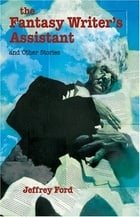 Posted : 17 years, 4 months ago on 19 February 2008 06:37
(A review of The Fantasy Writer's Assistant and Other Stories)
Posted : 17 years, 4 months ago on 19 February 2008 06:37
(A review of The Fantasy Writer's Assistant and Other Stories)This is the third book of Ford’s that I have read in the last year. I have had a chance to read a few of his short stories on his web site, before coming across this collection. One of them is actually in this collection (”At Reparata”).
Here is a list of the stories included:
“Creation”
“Out of the Canyon”
“The Fantasy Writer’s Assistant”
“The Far Oasis”
“The Woman Who Counts Her Breath”
“At Reparata”
“Pansolapia”
“Exo-Skeleton Town”
“The Honeyed Knot”
“Something by the Sea”
“The Delicate”
“Malthusian’s Zombie”
“On the Road to New Egypt”
“Floating in Lindrethool”
“High Tea with Jules Verne”
“Bright Morning”
The first thing I found interesting was how Ford likes to use himself, in a way, as a character in the stories. Quite a few of the stories feature the lead character as someone very similar to himself. He even went so far as seemingly using himself as the main character (using first person) in “Bright Morning”, but then having himself (Jeffrey Ford, the author) show up as another character he has a bidding war with over an antique edition of short stories by Franz Kafka.
First the bad, or at least to me. “The Delicate” was downright weird. I had no clue what was going on, but it had something to do with a highly ferocious being that would kill people, named the Delicate. And then there was “Pansolapia” which has many things happening at once, but at different sections of time. Meaning that all the events of time are actually played out at once. Too much for me to understand.
Also, I didn’t like “Out of the Canyon” too much, but mostly because I didn’t understand how the curse worked, which is the center of the story. The writing and the story itself was interesting and well written.
The rest of the book was great. “Exo-Skeleton Town” was very tragic and sorrowful. And very captivating. “Malthusian’s Zombie” was a great combination of mystery and spookiness, along with humor and everyday life, all mixed together with a very surprising end.
“At Reparata” was a rather funny, but also a deep and serious story of a king that gives society’s outcasts positions in his court. The position titles are ridiculous and sometimes without meaning. But after the king’s wife dies, he falls into a deep depression. To rescue him and the kingdom, these subjects of the court find themselves actually taking up their posts, no matter how ridiculous the title.
Two other highlights are “On the Road to New Egypt” and “The Fantasy Writer’s Assistant”. In “New Egypt” the main character (Ford himself again) picks up a hitchhiker, who turns out to be Jesus. Down the road a bit, they then pick up another hitchhiker who turns out to be Satan. Then Jesus and Satan wager up Jeff’s soul on a bet that a woman in Florida can make miracles happen, and she has to before the night is through. It is blasphemy, but funny. “The Fantasy Writer’s Assistant” has different levels of emotion, and is a good kick in the pants at epic fantasy writers around the world.
Overall this was a real enjoyable book. Ford is part of a new wave of modern style fantasy writers out there, or ones that blend the genre with science fiction, along with Jeff VanderMeer and China Miéville.
Here is a list of the stories included:
“Creation”
“Out of the Canyon”
“The Fantasy Writer’s Assistant”
“The Far Oasis”
“The Woman Who Counts Her Breath”
“At Reparata”
“Pansolapia”
“Exo-Skeleton Town”
“The Honeyed Knot”
“Something by the Sea”
“The Delicate”
“Malthusian’s Zombie”
“On the Road to New Egypt”
“Floating in Lindrethool”
“High Tea with Jules Verne”
“Bright Morning”
The first thing I found interesting was how Ford likes to use himself, in a way, as a character in the stories. Quite a few of the stories feature the lead character as someone very similar to himself. He even went so far as seemingly using himself as the main character (using first person) in “Bright Morning”, but then having himself (Jeffrey Ford, the author) show up as another character he has a bidding war with over an antique edition of short stories by Franz Kafka.
First the bad, or at least to me. “The Delicate” was downright weird. I had no clue what was going on, but it had something to do with a highly ferocious being that would kill people, named the Delicate. And then there was “Pansolapia” which has many things happening at once, but at different sections of time. Meaning that all the events of time are actually played out at once. Too much for me to understand.
Also, I didn’t like “Out of the Canyon” too much, but mostly because I didn’t understand how the curse worked, which is the center of the story. The writing and the story itself was interesting and well written.
The rest of the book was great. “Exo-Skeleton Town” was very tragic and sorrowful. And very captivating. “Malthusian’s Zombie” was a great combination of mystery and spookiness, along with humor and everyday life, all mixed together with a very surprising end.
“At Reparata” was a rather funny, but also a deep and serious story of a king that gives society’s outcasts positions in his court. The position titles are ridiculous and sometimes without meaning. But after the king’s wife dies, he falls into a deep depression. To rescue him and the kingdom, these subjects of the court find themselves actually taking up their posts, no matter how ridiculous the title.
Two other highlights are “On the Road to New Egypt” and “The Fantasy Writer’s Assistant”. In “New Egypt” the main character (Ford himself again) picks up a hitchhiker, who turns out to be Jesus. Down the road a bit, they then pick up another hitchhiker who turns out to be Satan. Then Jesus and Satan wager up Jeff’s soul on a bet that a woman in Florida can make miracles happen, and she has to before the night is through. It is blasphemy, but funny. “The Fantasy Writer’s Assistant” has different levels of emotion, and is a good kick in the pants at epic fantasy writers around the world.
Overall this was a real enjoyable book. Ford is part of a new wave of modern style fantasy writers out there, or ones that blend the genre with science fiction, along with Jeff VanderMeer and China Miéville.
 0 comments, Reply to this entry
0 comments, Reply to this entry
 Login
Login
 Home
Home 10 Lists
10 Lists 74 Reviews
74 Reviews Collections
Collections